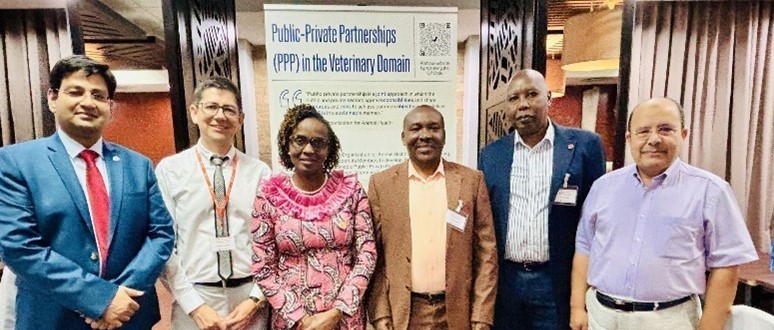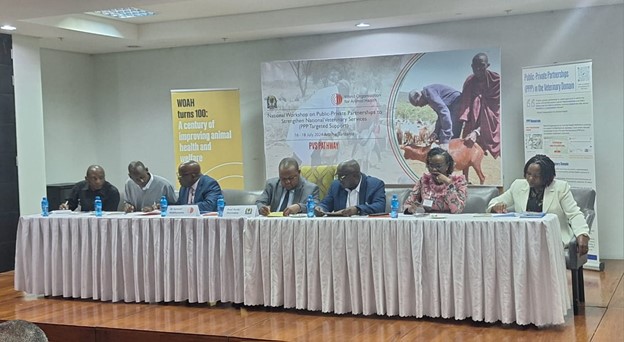
L to R: Dr Amani Kilemile (Registrar Veterinary Council of Tanzania); Dr Alex Chang’a (Private Veterinarian Lead); DR Samuel Wakhusama (WOAH Representative SRR-EA); Prof Riziki Shamdoe (Permanent Secretary Ministry of Livestock and Fisheries, Tanzania); Dr Stanford Ndibalema (Deputy Director of Veterinary Services, Tanzania); Dr Mary Mbole-Kariuki (Technical Expert, AU-IBAR); Dr Stella Kiambi (ECTAD Country Lead in Tanzania)
Public-private partnerships (PPPs) are increasingly recognised as powerful tools for advancing animal health services and addressing critical challenges such as disease control and eradication. The World Organisation for Animal Health (WOAH) supports the development of PPPs as a means to strengthen national veterinary systems, build capacity, and foster innovation.
In response to Tanzania’s request for targeted support, the PVS PPP initiative was implemented to strengthen Veterinary Services and assist the country’s efforts to eradicate Peste des petits ruminants (PPR) through private sector involvement. The goal of this initiative was to foster partnerships that would enhance Tanzania’s veterinary services and support its broader animal health objectives.
From 18 June to 18 July 2024, WOAH facilitated a series of activities aimed at building Tanzania’s capacity to establish effective public-private partnerships (PPPs) to combat PPR. These activities brought together national stakeholders to focus on improving veterinary services, fostering collaboration, and creating actionable plans for PPR eradication.
Key preparatory activities:
The activities culminated in a three-day national workshop held at Mount Meru Hotel, Arusha, Tanzania. This event brought together 128 national participants representing the public and private sectors, academia, professional associations, and veterinary regulatory authorities.
Key dignitaries delivering opening remarks included Dr. Samuel Wakhusama, WOAH Sub-Regional Representative for Eastern Africa, Dr. Stella Kiambi, ECTAD Country Lead, Tanzania (representing FAO Tanzania), and Dr. Stanford Ndibalema, Deputy Director of Veterinary Services, representing the Director of Veterinary Services and WOAH Delegate for Tanzania.
The workshop was officially opened by Hon. Prof. Riziki Shemdoe, Permanent Secretary, Ministry of Livestock and Fisheries, who emphasised the importance of PPPs in strengthening Tanzania’s Veterinary Services.
Workshop methodology and objectives
The PPP workshop was designed to build capacity among participants to develop, manage, and sustain public-private partnerships that would improve animal health services, with a particular focus on PPR control and eradication.
Objectives:
The workshop utilised a range of interactive methods including presentations, group work sessions, and plenary discussions. Participants also received resource materials such as the PPP Handbook, the PPP Database, and e-learning courses to enhance their understanding of PPPs in veterinary services.
The workshop strongly emphasised the learning process and the development of potential PPP proposals by participants in various groups. These proposals were designed to address specific challenging areas related to improving animal health and welfare in Tanzania. This hands-on approach significantly added value to the learning experience, equipping participants with the practical skills needed to conceptualise and develop PPP projects. The workshop aimed to enhance the partnership capacities of both public and private stakeholders, leading to the development of six impactful proposals. Participants can utilise this learning to create customised PPP proposals in the future.
The participants worked in groups to develop business cases for PPPs that would address gaps in Tanzania’s Veterinary Services. These proposals were designed to be practical and aligned with Tanzania’s strategic objectives for animal health improvement.
Key business cases developed:
A Section of participants during group discussions.
The workshop saw strong engagement from both the Government and other stakeholders, reaffirming Tanzania’s commitment to developing and implementing PPPs in the animal health sector. Hon. Prof. Riziki Shemdoe, Permanent Secretary of the Ministry of Livestock and Fisheries, highlighted the need for an action plan to effectively initiate, manage, and monitor PPP projects in the veterinary domain.
Other development partners, such as FAO (Tanzania), demonstrated their support by participating in the workshop and co-sponsoring the event. FAO also utilised the occasion to hand over 3.9 million doses of PPR vaccines to the Government of Tanzania, a critical step toward achieving the country’s PPR eradication goals.
The PVS PPP Targeted Support initiative has laid a strong foundation for Tanzania to integrate PPPs into its national Veterinary Services. By fostering collaboration between the public and private sectors, these partnerships have the potential to significantly enhance the country’s capacity to control and eradicate PPR, as well as address other critical animal health challenges. The commitment of the Tanzanian Government, along with the support of international partners like WOAH, ensures that the benefits of these partnerships will continue to strengthen the country’s veterinary services and contribute to sustainable animal health management.




